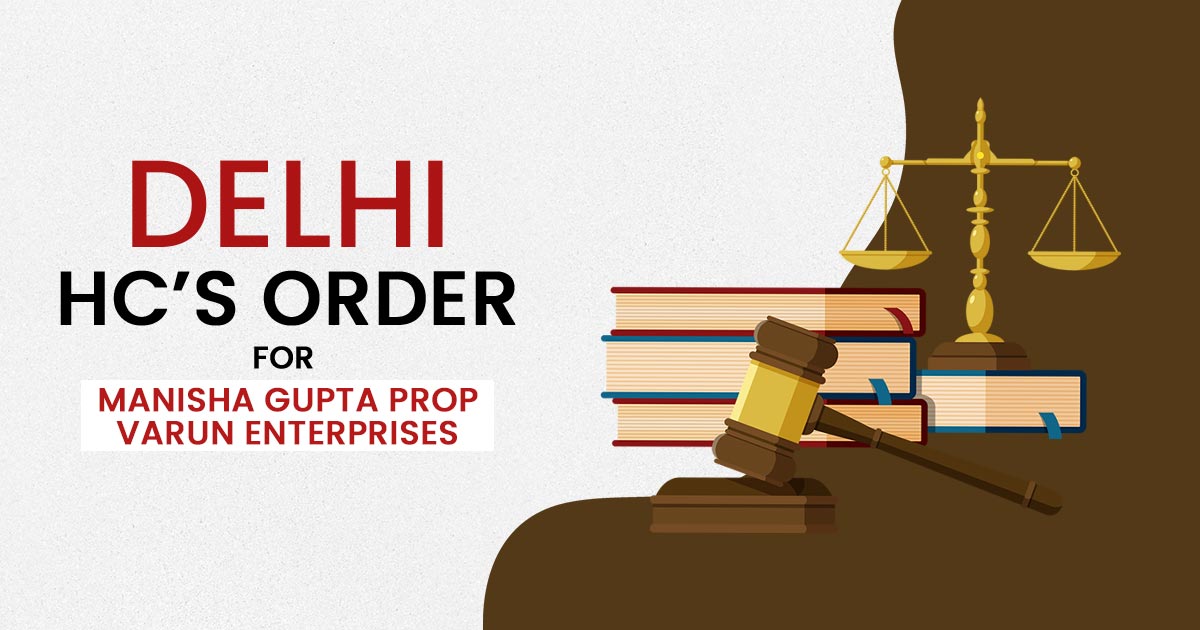
Manisha Gupta Prop Varun Enterprises Vs Union of India Through Secretary Ministry of Finance & Ors (Delhi High Court)
On the retrospective cancellation of Goods and Services Tax (GST) registration, the legal battle in Manisha Gupta Prop Varun Enterprises vs. Union of India sheds light concerning about the procedure of integrity and objective criteria. The blog focuses on the major facts of the case showing the applicant’s grievances, the legal framework, and the judgment of the Delhi High Court.
Context for Cancelling GST Registration
The order on 7.10.2022 has been contested by the applicant cancelling their GST enrollment retrospectively from 02.07.2017. On 23.09.2022, the SCN quoted non-filing of the returns for 6 consecutive months based on the potential cancellation. The applicant is involved in the surgical sale and goods trading, availed to have the ceased business dated 28.01.2019, which initiates the process of cancellation dated 3.08.2022.
Overview of Legal Proceedings
i. Cancellation Retroactively and Absence of Convincing Reasons
- The retrospective cancellation is been challenged by the applicant, stating that the notice as well as the order does not have the particularity for the reasons.
- The impugned order quotes no answer obtained from the assessee, however, unable to furnish a rationale for the retrospective actions.
Read also: Delhi HC: GSTIN Can’t be Cancelled With Retrospective Effect for Non-filing of Returns
ii. Procedural Shortcomings in the Cancellation Procedure
- On 16.08.2022, the applicant’s cancellation application was rejected because of the alleged non-submission of the needed documents.
- On 23.09.2022 Show Cause Notice (SCN) did not explicitly notify the applicant of the retrospective cancellation possibility, denying them a fair chance to object.
iii. Legal Examination and Court Intervention
- Section 29(2) of the Central Goods and Services Tax Act, 2017 scrutinized by the court, highlights that retrospective cancellation needs the proper officer’s satisfaction established on objective criteria.
- The judgment shows that the non-filing of returns solely does not prove the retrospective cancellation; it needs to align with the compliance status of the assessee at the time of questioning.
- Potential repercussions for the taxpayer’s customers are been considered by the court and the requirement of the proper officer to acknowledge these results before the retrospective cancellation.
Legal Ruling and Revision
The plea is been permitted via court, considering the applicant’s submission which they ceased business in January 2019. Amendment of the retrospective cancellation, wef 28.1.2019, aligning with the alleged cessation of business. Keeping their rights under the law, the court clarifies that recovery phases for tax, penalty, or interest are open to the authorities,
Closure- At the time of cancellation of GST registration, the case sets a precedent highlighting the importance of procedural fairness and objective criteria. Through curbing the retrospective effect, the court’s intervention furnishes relief to the applicant, showcasing a balanced process that acknowledges the taxpayer’s rights as well as the tax authorities’ responsibilities. This judgment emphasizes the demand for a judicious application of legal provisions to assure equity and transparency in tax-related decisions, as the GST evolves.
| Case Title | Manisha Gupta Prop Varun Enterprises Vs. Union of India |
| Citation | W.P.(C) 381/2024 |
| Date | 22.01.2024 |
| Petitioner by | Mr A. K. Babbar, Mr Surinder Kumar & Mr Rahul Chouhan |
| Respondent by | Mr. Shashank Sharma |
| Delhi High Court | Read Order |









